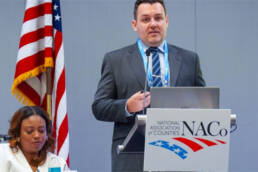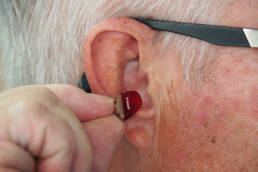Alzheimer’s disease is a very significant issue with seniors. Nearly 55,000 people 65 and older in Nevada live with Alzheimer’s disease. Alzheimer’s disease is a brain disorder that slowly destroys memory and thinking skills, and eventually, the ability to carry out the simplest tasks. It typically appears later in life, with most cases affecting people aged 65 or older. Early-onset Alzheimer’s, which occurs between a person’s 30s and mid-60s, is very rare. Common symptoms include memory loss, language problems, and changes in behavior and personality.
Estimates vary, but experts suggest that more than 7 million Americans, most of them age 65 or older, may have Alzheimer’s, projected to more than double by 2050. It is costing our nation $350 billion, not to mention 18 billion hours of caregiving a year. It is currently ranked as the seventh leading cause of death in the United States and is the most common cause of dementia among older adults. In addition to Alzheimer’s causing a loss of cognitive functioning, it causes a loss of behavioral abilities to such an extent that it interferes with a person’s daily life and activities. Dementia ranges in severity from the mildest stage, when it is just beginning to affect a person’s functioning, to the most severe stage, when the person must depend completely on others for help with basic activities of daily living.
Alzheimer’s disease is named after Dr. Alois Alzheimer. In 1906, Dr. Alzheimer noticed changes in the brain tissue of a woman who had died of an unusual mental illness. Her symptoms included memory loss, language problems, and unpredictable behavior. After she died, he examined her brain and found many abnormal clumps (now called amyloid plaques) and tangled bundles of fibers (now called neurofibrillary, or tau tangles). These plaques and tangles in the brain are still considered some of the main features of Alzheimer’s.
As you may be aware there are many new treatments for Alzheimer’s disease in the pipeline and the Food and Drug Administration (FDA) has approved two new treatments recently. Unfortunately, the Centers for Medicare and Medicaid Services (CMS) is now erecting roadblocks to prevent timely access for seniors to these approved medications to treat early onset Alzheimer’s disease.
This new CMS rule states that Medicare will not cover the two newest FDA approved treatments unless patients agree to participate in clinical trials or patient registries. This is an unprecedented decision – no other already approved medications have been subject to this CMS rule. And more alarming, CMS has never used their authority to block access to an entire class of new drugs.
If you have ever watched a loved one begin showing signs of Alzheimer’s Disease, you know how urgent it is to find treatment for this debilitating condition. More than 2,000 people a day in the U.S. progress from mild to moderate Alzheimer’s Disease, making access to early and effective treatment a priority for patients and their families. In the last eighteen months, patients and their families have been given renewed hope for their ability to access treatment as the FDA approved two new treatments for early stage Alzheimer’s. Unfortunately, the CMS is now erecting roadblocks to prevent timely treatment of the disease for seniors when they need it the most.
The care of the seven million Alzheimer’s patients throughout the country, is currently threatened by this new CMS rule that states Medicare will not cover the two newest FDA-approved Alzheimer’s treatments used for mild disease unless patients agree to participate in redundant and onerous clinical trials or patient registries. You read that correctly – Medicare will not provide coverage for medications that treat early-stage Alzheimer’s disease unless patients agree to join clinical trials for medications that have already been FDA-approved. This is unprecedented on two counts: no other already-approved medications have been subject to this rule. Perhaps more disturbingly, never before has CMS used their authority to block access to an entire class of new drugs in this fashion.
The Alzheimer’s medications in question have already gone through years-long research to establish their safety and efficacy in treating Alzheimer’s disease. Making patients participate in additional clinical trials as a condition of Medicare coverage is unnecessary and will only serve to delay, and in some cases deny, care for patients who are desperate to keep their disease at bay for as long as possible.
Remember that clinical trials typically require a “control” group of patients who only receive a placebo – an inactive dose – to compare against patients receiving the actual medication. In other words, half of those seeking treatment through this avenue could spend precious time not getting the newest treatment at all. Clinical trials must also sometimes exclude potential participants based on existing medical conditions that would complicate treatment or the progression of their disease.
Some patients would find themselves excluded from trials based on where they live, as those outside of large urban areas do not always have access to clinical trials at their local medical facilities and could be forced to travel long distances for care. Finally, the administrative process to qualify for clinical trials can take months to years. During this time, patients could progress from mild to moderate disease and miss their window for treatment all together. This burden weighs heavily on the 84,000 Nevadans who serve as family caregivers for Alzheimer’s patients and who must try to navigate through this cumbersome and unnecessary process.
Alzheimer’s disease patients in Nevada and all around the country have a narrow window of opportunity to get treatment for mild disease before it progresses. The last thing patients and their families need when faced with this disease are monetary and administrative barriers to the care their providers decide they need. Recently approved drugs offer a new ray of hope for those who’ve received a terrifying diagnosis. Instead of complicating access to these groundbreaking new scientifically tested therapies, CMS should ensure that our seniors can benefit to the latest FDA-approved treatments that “add life to years”.
If you are interested in helping with this issue, you could put a call in or write to your member of congress asking them to take action to urge CMS to reverse their decision on Alzheimer’s medications making them available to all. If you would like help with this please email me.
Lawrence J. Weiss, Ph.D. is CEO of the Center for Healthy Aging. Dr. Weiss welcomes your comments on this column. Write to him at [email protected] or c/o Center for Healthy Aging, 11 Fillmore Way, Reno, NV 89519.



















































































































